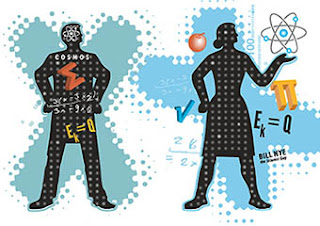 |
| Image Source: Physics Today home page |
Topics: Commentary, Diversity, Diversity in Science, Mark G. Raizen, Women in Science
This was an article that gave me a slight chuckle (the obvious double entendre of superhero secret identities and by inference of the topic trigonometric identities we all used to have to memorize). I can personally attest there are four major epochs (my reference) one goes through in the field:
"I major in physics";
"I 'majored' in physics";
"I work in a 'physics-related' field" also "my physics background helps me in my current field";
"I am a physicist."
Mark G. Raizen, one of the smartest physicist I know doing cutting edge research in atomic physics and quantum optics, was once a theoretical physics grad student under Steven Weinberg before he changed focus to being an experimental physicist. (Trivia: he even has a Wiki page on WOW.com). Mark once wished me a happy birthday on Facebook, referring to me as a "fellow physicist." I was at the time pursuing my Graduate Certificate in Microelectronics and Photonics from Stevens University I've since completed. I start again with the graduate physics department in the fall, as I only have 18 hours to a full Masters degree. With this background and my current industry focus on Implant, I hope to go as far as my preparation takes me.
I admit, I was flattered and honored, thinking my diversions - the military, industry, selling home security systems (long story) and high school physics teacher wasn't a "pure" path, and thus I bounced quite liberally between #2 and #3. Though he said it quite casually, it did knock me for a loop and change my own self-perceptions. Mark and Alicia Raizen's friendship has been inspirational (I met Alicia on an appointment with the aforementioned security company; then Mark who took me on a tour of his laboratory with his graduate students at UT Austin). I admit some evolution had to take place for me to get to and accept the fourth epoch. From that point and ever since, I have been referring to myself publicly, and proudly... as a physicist.
A series of interviews with undergraduates yields some surprising insights into how the students come to think of themselves as physicists.
Are you a physicist? How did you become a physicist? The answers to those questions are not as straightforward as one might think. The routes into physics are as diverse as physicists themselves. The sources of our early affinities for physics range from childhood fascinations with the universe to that introductory physics class that made you ask more questions than you could answer.
Acquiring a professional identity is a fundamental part of any student’s development.1 Students are significantly more likely to persist with a program in physics—or any other discipline—when they identify themselves as students of that discipline.2 However, developing an identity as a professional physicist and member of the physics community is a complicated process that can take a long time and involve overcoming multiple barriers.
To examine how identities change over time, we studied the experiences of 20 undergraduate physics students (3 women and 17 men) at Kansas State University over six semesters beginning with their modern physics class. Seven of the students remained in the study until the end. We interviewed each student several times, focusing on their developing experiences with physics and their perceptions of what it means to be a physicist. Our methods are described in the box on page 48.
We tracked changes in their perceptions over time as they engaged in more physics practices, such as upper-division coursework and undergraduate research. Students’ experiences with different authentic physics practices changed their perceptions of what it means to be a physicist. We used those changing perceptions as a starting point to investigate the students’ evolving physics identities.
Physics Today: Developing Physics Identities, Paul W. Irving and Eleanor C. Sayre
Comments